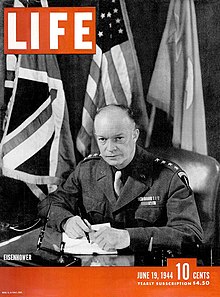Life (magazine)

A cover of the earlier Life magazine from 1911
|
|
| Editor | George Cary Eggleston |
|---|---|
| Former editors | Robert E. Sherwood |
| Categories | Humor, General interest |
| Frequency | Weekly |
| Publisher | Clair Maxwell |
| Total circulation (1920) |
250,000 |
| First issue | January 4, 1883 |
| Final issue | November 1936 |
| Country | United States |
| Based in | New York City, New York, U.S. |
| Language | English |

Cover of the June 19, 1944 issue of Life with Gen. Dwight D. Eisenhower. The issue contained 10 frames by Robert Capa of the Normandy invasion.
|
|
| Editor-in-chief | Edward Kramer Thompson |
|---|---|
| Categories | News |
| Frequency | Weekly (1936–1972) Monthly (1978–2000) |
| Publisher | Henry Luce |
| Total circulation (1937) |
1,000,000 |
| First issue | November 23, 1936 |
| Final issue | May 2000 |
| Company | Time Inc. |
| Country | United States |
| Based in | New York City, New York, U.S. |
| Language | English |
| Website | www |
| ISSN | 0024-3019 |
Life was an American magazine that ran weekly from 1883 to 1972, published initially as a humor and general interest magazine. Time founder Henry Luce bought the magazine in 1936, solely so that he could acquire the rights to its name, and shifted it to a role as a weekly news magazine with a strong emphasis on photojournalism. Life was published weekly until 1972, as an intermittent "special" until 1978, and as a monthly from 1978 to 2000.
After the monthly Life stopped issuing their magazines, Time Inc. continued to use the Life brand for special and commemorative issues. Life returned to regularly scheduled issues when it became a weekly newspaper supplement from 2004 to 2007. The website life.com, originally one of the channels on Time Inc.'s Pathfinder service, was for a time in the late 2000s managed as a joint venture with Getty Images under the name See Your World, LLC,. On January 30, 2012 the LIFE.com URL became a photo channel on Time.com.
When Life was founded in 1883, it was developed as similar to the British magazine, Punch. It was published for 53 years as a general-interest light entertainment magazine, heavy on illustrations, jokes and social commentary. It featured some of the greatest writers, editors, illustrators and cartoonists of its era, including Charles Dana Gibson, Norman Rockwell and Jacob Hartman Jr. Gibson became the editor and owner of the magazine after John Ames Mitchell died in 1918. During its later years, the magazine offered brief capsule reviews (similar to those in The New Yorker) of plays and movies currently running in New York City, but with the innovative touch of a colored typographic bullet resembling a traffic light, appended to each review: green for a positive review, red for a negative one, and amber for mixed notices.
The Luce Life was the first all-photographic American news magazine, and it dominated the market for more than 40 years. The magazine sold more than 13.5 million copies a week at one point; it was so popular that President Harry S. Truman, Sir Winston Churchill, and General Douglas MacArthur all had their memoirs serialized in its pages. Luce purchased the rights to the name from the publishers of the first Life but sold its subscription list and features to another magazine; there was no editorial continuity between the two publications.
...
Wikipedia
